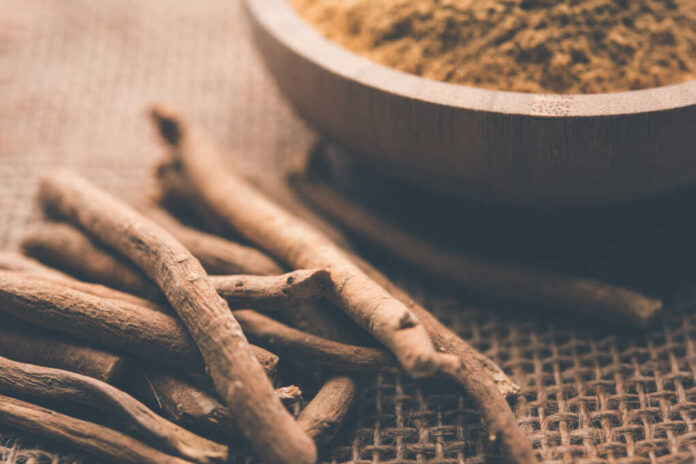
Ashwagandha shows promise in managing an underactive thyroid by potentially boosting thyroid hormone levels and alleviating symptoms like fatigue and joint pain.
But before using it you need to consider a few things, keep reading to find out!
What is Ashwagandha?
Ashwagandha is an ancient herb from India and Southeast Asia. It’s also called Indian ginseng or winter cherry. People have used it for a long time to feel better and treat different problems.
The name “ashwagandha” means “smell of the horse” in an old Indian language because it has a unique smell. It’s been used in Ayurvedic medicine, an old Indian practice, for many things like reducing stress, improving energy, and even helping with fertility.
Scientists are now studying ashwagandha to see if it can help with thyroid problems.
Types of Thyroid Disorders
There are two main types of thyroid disorders: hypothyroidism and hyperthyroidism.
Hypothyroidism:
This occurs when the thyroid gland is underactive and doesn’t produce enough thyroid hormones. Symptoms include fatigue, weight gain, muscle weakness, hair thinning, slow heart rate, constipation, and elevated cholesterol levels.
Some may also experience symptoms of depression due to decreased glucose metabolism and blood flow to the brain. People with hypothyroidism may have a lower tolerance to cold temperatures.
Hyperthyroidism:
In contrast, hyperthyroidism happens when the thyroid gland is overactive and produces too many hormones. Symptoms include unexplained weight loss, rapid heartbeat, heart palpitations, irritability, excessive sweating, muscle weakness, fine hair, changes in bowel movements, and hand tremors.
Similar to hypothyroidism, depression, and anxiety are common in individuals with hyperthyroidism.
Can Ashwagandha Improve Thyroid Health?
Ashwagandha, an adaptogenic herb, has garnered attention for its potential benefits in supporting thyroid health. Let’s explore its effects on both hypothyroidism and hyperthyroidism.
Hypothyroidism: In this condition, the thyroid gland produces insufficient thyroid hormones. A study involving 50 individuals with hypothyroidism showed promising results with ashwagandha supplementation.
Those who took a daily dose of 600mg of ashwagandha extract experienced significant increases in T3 and T4 hormone levels and decreased thyroid-stimulating hormone levels.
One theory suggests that ashwagandha’s cortisol-lowering properties may contribute to its effectiveness in hypothyroidism.
Hyperthyroidism: Conversely, in hyperthyroidism, the thyroid gland produces excessive hormones. While there’s limited direct evidence, ashwagandha’s ability to lower thyroid-stimulating hormone levels and increase T3 and T4 levels could potentially exacerbate hyperthyroid symptoms and lead to thyrotoxicosis—a dangerous condition characterized by excessively high thyroid hormone levels.
Thyroid-Stimulating Hormone (TSH) Levels: TSH regulates thyroid hormone production. Ashwagandha supplementation tends to reduce TSH levels, making it beneficial for hypothyroidism. However, in hyperthyroidism, where TSH levels are already low, ashwagandha may further decrease TSH levels, potentially worsening the condition.
Before considering ashwagandha or any supplement for thyroid health, consult with a healthcare professional to determine the most appropriate course of action.
Is it Safe to Take Ashwagandha with Thyroid Medicine?
Some people might consider taking ashwagandha along with their thyroid medication. However, this might not be a good idea, especially if you have hyperthyroidism. In this case, ashwagandha could interfere with the effects of your medication.
In some situations, it might be okay to take ashwagandha with levothyroxine, but it’s important to consult your doctor first. Combining these two could lead to a larger increase in thyroid hormones, which might cause symptoms similar to those of hyperthyroidism.
How to Use Ashwagandha for Hypothyroidism
- If you’re thinking about using ashwagandha for hypothyroidism, it’s essential to talk to your doctor first. They can give you advice and make sure it’s safe for you.
- If your doctor says it’s okay, you can find Ashwagandha supplements in different forms like capsules, powder, or liquid extract. Just follow your doctor’s dosage because it can vary depending on the product.
- When choosing Ashwagandha supplements, look for certified organic ones that don’t contain any extra ingredients that might cause problems for you.
- It’s also good to ask the supplement company for quality assurance documentation. This helps make sure the supplement is safe to use.


















